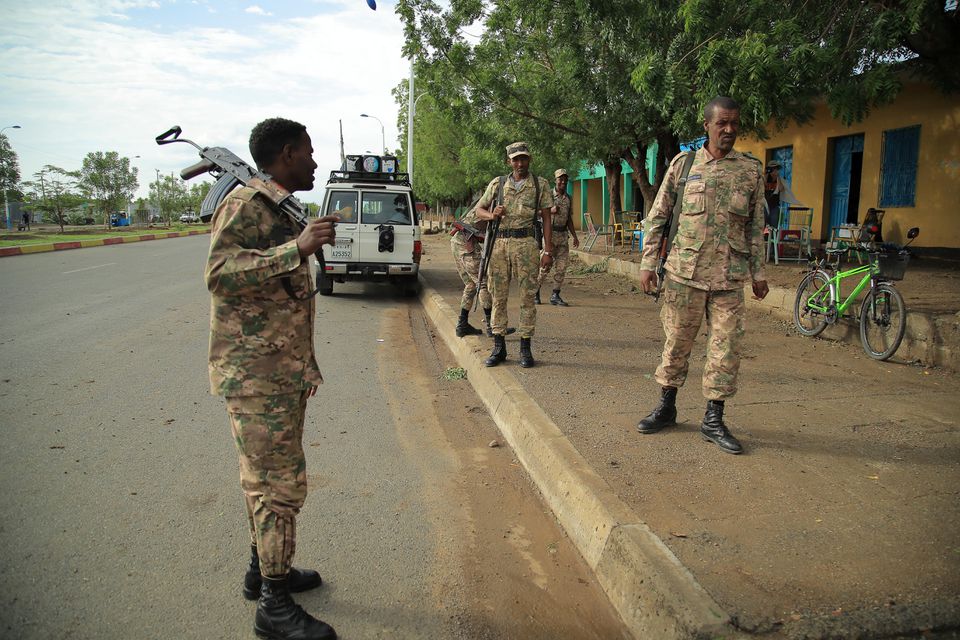Ethiopia conflict heats up as Amhara region vows to attack Tigray forces

By ![]()
ADDIS ABABA, July 14 (Reuters) – Ethiopia’s war in the northern region of Tigray looked set to intensify on Wednesday as the prime minister signalled the end of a government ceasefire and the neighbouring Amhara region said it would go on the offensive against Tigrayan forces.
The Tigray People’s Liberation Front (TPLF), which has recaptured most of its home region in the past three weeks after an abrupt reversal in an eight-month war, has vowed to retake western Tigray, an expanse of fertile territory controlled by Amhara forces who seized it during the conflict.
Prime Minister Abiy Ahmed abruptly pulled central government troops out of most of Tigray last month, citing a unilateral ceasefire that the TPLF mocked as “a joke” designed to justify his forces’ retreat. Wednesday’s statement marked a shift in rhetoric, as Abiy said the ceasefire had failed to deliver.
A spokesman for the Amhara regional government also said the authorities there were rallying their own forces for a counter-attack against Tigrayan forces.
He did not respond to requests for further comment. On Tuesday the National Movement of Amhara, a major regional political party, called on irregular volunteer militia – known as Fano – to mobilise.
Western Tigray has long been home to large populations of both Tigrayans and Amhara, and renewed fighting between two of Ethiopia’s biggest ethnic groups over the territory could drive another wave of refugees from a conflict that has already forced 2 million from their homes.
When Abiy sent troops to fight the TPLF last year, Amhara militia fought on the central government’s side, using the opportunity to take control of a swathe of territory administered by Tigrayans for decades.
But a tougher fight could loom for western Tigray, which the Amhara consider a reclaimed part of their own historic homeland and have vowed to keep under their control.
ABIY STEPS BACK FROM CEASEFIRE
Abiy’s more forceful remarks in a statement on Wednesday suggested his government was abandoning its three-week-old emphasis on its ceasefire declaration, proclaimed as government troops abandoned regional capital Mekelle to the advancing TPLF.
He blamed the TPLF for choosing to fight rather than allow in aid or observe the ceasefire, and accused them of recruiting, drugging and deploying child soldiers.
TPLF spokesman Getachew Reda dismissed the claim.
“We don’t have child soldiers because mature soldiers are never in short supply,” he told Reuters via satellite phone.
REFUGEES STUCK IN THE MIDDLE
Caught in the middle of the fighting are 23,000 Eritrean refugees sheltering in two camps near the town of Mai Tsebri. Many have already fled the Tigrayan war once when two other refugee camps were destroyed, and told Reuters they had seen refugees kidnapped and killed during previous fighting.
One refugee from Adi Harush camp told Reuters Tigrayan militia were searching refugees’ homes and confiscating cell phones.
Tigrayan militia took about 19 refugees from Adi Harush on Wednesday to an unknown location and one refugee – a Muslim man – was killed after they told him to carry some weapons and he refused, another refugee told Reuters.
“Our forces are not after Eritrean refugees. We will make sure refugees are protected and we are more than ready to investigate any claims,” TPLF’s Getachew said, adding refugees would be permitted to leave the area if they wished.
Tesfahun Gobezay, head of Ethiopia’s refugee agency, said they wanted to relocate the refugees away from fighting as fast as possible.